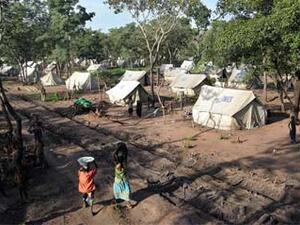Assistant High Commissioner for Operations mission to Chad
Assistant High Commissioner for Operations mission to Chad
Judy Cheng-Hopkins, UNHCR's new Assistant High Commissioner for Operations, is scheduled to depart Sunday on a six-day mission to Chad. Ms. Cheng-Hopkins took up her post on Feb. 15, so this is her first mission and it's an important one given the many concerns we're facing in Chad and in the region as a whole.
The Assistant High Commissioner will review our operations both in eastern Chad, where we have 12 camps and more than 200,000 Sudanese refugees from Darfur, as well as in southern Chad where we continue to see a worrisome influx of thousands of refugees from the Central African Republic.
Ms. Cheng-Hopkins arrives in N'Djamena on Sunday night and travels immediately on Monday morning to Abéché and Bahai, in eastern Chad, to assess our field operations in the camps for Darfur refugees. On Tuesday, she will travel on to other camps in the east, including Farchana and Gaga, before returning to Abéché. At each stop, she will meet with local Chadian officials as well as UNHCR staff and our partners.
On Wednesday and Thursday, the Assistant High Commissioner will be in southern Chad, where we continue to see a steady flow of refugee arrivals from the northern Central African Republic. As we mentioned on Tuesday, more than 4,000 CAR refugees have arrived this month alone and we're quite concerned that more are on the way. Altogther, there are some 45,000 CAR refugees in the south. Ms. Cheng-Hopkins will visit border areas and the Amboko and Gondjé refugee sites, which have been receiving the new arrivals.
She will return to N'Djamena on Friday and will hold two days of talks in the capital with senior government officials, members of the diplomatic community, other UN agencies, UNHCR staff and our NGO partners. She returns to Geneva on Sunday, 5 March.
In south Chad, meanwhile, UNHCR has transferred 539 newly arrived Central African refugees (119 families) from the border since Wednesday to the Amboko and Gondjé refugee sites near the main southern town of Goré. We plan to move another 250 refugees today and the same number tomorrow. With the arrival of additional trucks expected in the coming days, UNHCR should be able to boost the daily transfer capacity above 300 persons. The majority of the new arrivals have been helped by residents of Békoninga, a Chadian village of some 700 inhabitants less than a kilometre from the border. UNHCR staff and our Chadian government partners are screening and registering the new arrivals at Békoninga prior to their transfer away from the border.
These refugees are among the latest influx of more than 4,000 people who have fled attacks by rebel groups and government forces in the northern region of the Central African Republic (CAR) since the beginning of February. The refugees also say they are fleeing attacks and looting by bandits. They say thousands of civilians fled their villages in northern CAR following attacks, and remain hidden in the bush, fearful of returning to their homes. Thus, we believe that the refugee influx from CAR into Chad will continue - our teams report that at least 100 persons are still crossing on a daily basis, down from about 200 daily at the beginning of the week.
In anticipation of more refugee arrivals, UNHCR and the Chadian authorities are discussing the opening of a new refugee site near Goré, in addition to the Amboko and Gondjé sites. The capacity of the Amboko site - 14,000 people - has already been reached, while at the current rate the Gondjé site will likely reach its limit of 15,000 people by mid-March. New refugees will have to be housed in the Amboko transit site until agreement on a third location is reached with the government.
There are presently 45,000 refugees from CAR in south Chad. More the 200,000 refugees from the Darfur region are also present in 12 camps in the eastern part of the country.


